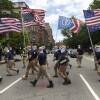Gov. Charlie Baker rejected the notion that the MBTA is failing on Boston Public Radio Thursday, even after riders faced a fire on an Orange Line train that forced around 200 passengers to evacuate. It’s just the latest in a string of accidents and service cuts amid a federal investigation into the system’s safety culture.
Co-host Jim Braude asked Baker if it was unfair to call the T a “mess.”
“Yes,” Baker responded, but acknowledged that the fire on the Orange Line was “unacceptable.”
“There's a lot of work that the T has done to dramatically improve its performance and to invest in modernizing its infrastructure over the course of the past eight years, there just is,” Baker said, pointing to on-time percentage data ranging from the 70s to 90s. “But stuff like this makes people crazy. It makes me crazy. And I completely understand why.”
Meanwhile, the MBTA has faced criticism for service cuts , derailments and other safety issues that even led to a recent death on the Red Line . The Federal Transit Administration, or FTA, recently began an investigation into the MBTA over concerns about safety and a lack of transparency.
"Do I think the T's performance needs to be better? Yes. Do I think that's the reason that people aren't coming to work? There's nothing in the data that supports that."Gov. Charlie Baker
“This is one of the reasons why I welcomed the FTA’s investigation into safety and operations of the T,” Baker said. “The first set of directives that they issued to the T were strong, solid and the T responded appropriately to them. ... I'm looking forward to seeing what they have to say about this.”
Despite the string of safety issues on the MBTA, Baker said he thinks remote work and struggling downtowns due to the pandemic are bigger drivers behind low ridership — a problem public transportation systems are facing across the country.
“Do I think the T’s performance needs to be better? Yes. Do I think that’s the reason that people aren’t coming to work? There’s nothing in the data that supports that,” Baker said.
On right-wing extremism in Massachusetts
In response to a question about rising political extremism in Massachusetts, the governor said there are very few incidents in the commonwealth compared to other parts of the country.
Baker said there is “no place for that anywhere in Massachusetts,” but that he believed “as a general rule there are very few incidents of that kind that take place here.”
“If you follow these issues nationally, there’s a lot more of it in other places, which I’m thankful for,” he continued.
GBH News reported In May that extremist movements are gaining ground in Massachusetts, citing Anti-Defamation League data that showed an increase in hate, extremism, antisemitism and terror incidents over the past five years — mostly in graffiti, leafleting or other racist propaganda.
And in July, about 100 members of Patriot Front — a white nationalist group formed in the aftermath of the Charlottesville Unite the Right rally in 2017 — marched through Boston.
In the case of the Patriot Front march, some city officials and terrorism experts declared the march through Boston an “intelligence failure” because local leaders were not informed the group had plans to come to the city.
On Boston Public Radio, Baker said he believed existing centers that track threats of this nature and online extremism do a good job of keeping cities, state and the federal government informed of extremist movements.
On the state of COVID
As a new COVID-19 variant yet again pushes up infection rates, Baker defended the decisions to release state COVID-19 data weekly rather than daily, and to continue with a mask-optional policy on the T. In Massachusetts, infection rates have plateaued rather than gone down, with reports at around 1,200 new reported cases per day.
More Politics
Baker said that the most important data already updates on a monthly basis, and that the daily numbers do not change much day-to-day due to unreported at-home testing and leveled hospital numbers.
“If the numbers really start to move, we'll have a discussion about whether or not we need to change the timeliness of our reporting,” Baker said. “But I think in many ways there's a lot of testing available, there are treatments that are available that work ... and we have the highest vaccination rate in the country.”
Still, the new variant has revived the debate around masking, given the high potential for reinfection. Baker said he plans to continue following federal guidance, which no longer requires masks on planes or other forms of transportation.
“It's very complicated for the T to have a standard on something like that that's dramatically different than the one that's being applied everywhere else in the country,” he said.
Baker made a plea for people who have not received booster shots to go to a vaccination site, adding that he will be meeting with the White House on Tuesday to discuss a potential second booster shot for people under 50. He said the state plans to ramp up outreach around boosters.
“We still have lots of vaccination sites all over the commonwealth, and if you haven't gotten boosted, you really should,” he said.









